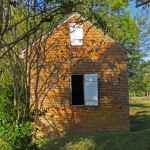— Story by Quest Whalen, Class of 2019, Tuskegee University, submitted kindness of Dr. Lisa Bratton, Professor, Tuskegee University
Dr. Bratton shared Ms. Whalen’s essay soon after their overnight at Historic Brattonsville on Friday, September 12, and participation in “By the Sweat of Our Brows,” including a gathering of the black and white descendants of the historic site. I asked if it could be published in BitterSweet: Linked Through Slavery, and Ms. Whalen gave her permission. I have done virtually no editing other than adding these notes.
The first-person narrator is Quest Whalen.

By The Sweat of Our Brows re-enactors
Although I am a mathematics major here at the Tuskegee University, when Dr. Bratton first mentioned Brattonsville Fall 2015, I was immediately intrigued by the trip. I first admired that Dr. Bratton could trace her lineage back to the Antebellum period. She furthered my interest when she described her current relationship with Brattonsville and the mention of sleeping in an original slave cabin. Therefore, before the fall 2015 semester completed, I already committed myself to attending the next trip to Brattonsville. I enthused over the thought of gaining the experience with so much historical meaning and connection.

Historic Marker

Bedding for the night
Before arriving to Brattonsville, I did not know what to expect. I knew the history of [the] Antebellum South, but to see it and in a sense setback in that time, Brattonsville gave me a deeper understanding of the time period and a more appreciative attitude of current times. Sleeping in the slave cabin brought on an overwhelming rush of emotion. I was not scared, but my heart was heavy. Although I do not read individual slave stories, simply being close to the slave cabin filled me with great empathy and gratitude for all in bondage persons. We had no electricity or modern conveniences when we stayed that night, but the reassurance came in knowing that those before me had the strength to survive. That night I was able to fall asleep embracing that I am the living history that choose not to remain stagnant.
The morning of By the Sweat of Our Brows I woke with my mom and walked along the grounds of the former plantation, imagining that our footprints journeyed the same paths Dr. Bratton’s ancestors and others like them traveled, but that is where our path and theirs diverged. Even without her ancestors being present, I saw them toiling through their morning duties to prepare and start the day. When the event started, we were able to witness the once divided sides unite to acknowledge and appreciate the past. My mom and I explored the grounds where there were people dressed in time period clothes reenacting the historical figures. I admired the in-depth research that went in to piecing parts together to gain the whole story. The ancestors of [the] Seven Sacred families did not have animosity towards anyone but gratefulness for those who [persevered] through their struggles. The day was dedicated for ancestors and not for self. We all removed selfish ambitious, comfort, and feelings so that we could pay homage.

Plantation House
Our trip ended with Dr. Bratton’s presentation, “Straight Outta Brattonsville,” inspiring me to research my own identity. She showed the

Surviving Slave Dwelling
relevance in details like receipts and land titles. My Brattonsville experience encourages me to further research the past with the knowledge that there are unknown truths that still have relevance and power in present day. Brattonsville brings humility, encouragement, and appreciation that often time can be easily overlooked by the trifling distractions of today. Even though I left Brattonsville, I did not leave behind the story in Brattonsville. Now having experienced a small part of the life of those before me, my life’s story now contains theirs. The story never dies; his story is my story. One worth being told and added to.
Quest Whalen, Class of 2019, Tuskegee University
Posted by Prinny Anderson


What a wonderful account of the visit. So important for us to experience the past physically, emotionally and spiritually. Thank you Quest and Prinny.
Beautifully written, thanks so much for this essay. “The day was dedicated for ancestors and not for self. We all removed selfish ambitious, comfort, and feelings so that we could pay homage.” Very moved by your words.